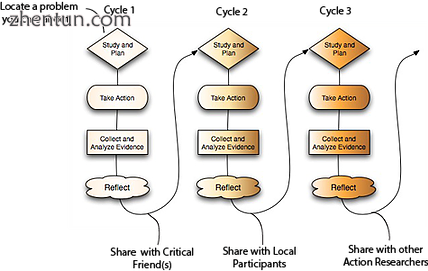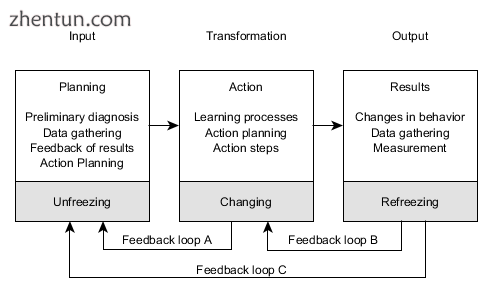行为研究通过采取行为和进行研究的同时过程寻求变革性变革,这些过程通过批判性反思联系在一起。当时麻省理工学院教授库尔特·勒温在1944年首次创造了“行为研究”一词。在1946年的论文“行为”中研究和少数民族问题“他将行为研究描述为”对各种形式的社会行为和研究导致社会行为的条件和影响的比较研究“,其使用”螺旋式步骤,每个步骤由一个规划圈组成关于行为结果的行为和事实调查“。
行为研究从业者反思他们自己的问题,信念,假设和实践的后果,以及理解,发展和改进社会实践的目标。[1]这一行为旨在创造三个层面的变化[2](1)自我变化,因为行为研究的唯一主题是进行研究的人。这个人正在寻求更好地理解他们在社交场合中的行为所产生的影响,并参与一个生活他或她的价值观的过程。第二级是理解课堂,办公室,社区,组织或机构变化的集体过程。行为研究使其他人参与进来,并努力创造民主的声音分享,以更好地理解集体行为[3]。最后,行为研究是与研究人员共享发现的过程。这可以通过多种方式完成,包括期刊[4],网站,书籍,视频或会议。社会出版商基金会[5]为这一行为研究过程提供支持。
行为研究涉及通常通过现有组织积极参与变革情况,同时进行研究。行为研究也可以由大型组织或机构进行,由专业研究人员协助或指导,旨在改进他们实践所处环境的战略,实践和知识。作为设计师和利益相关者,研究人员与其他人合作,提出新的行为方案,以帮助他们的社区改善其工作实践。根据行为研究中涉及的人员的性质以及组织行为研究的人员,有不同的方式来描述行为研究[6]。
协作行为研究
参与式行为研究
基于社区的行为研究
青年行为研究
行为研究和行为学习
参与式行为学习和行为研究
集体行为研究
行为科学
生活理论行为研究
还有一套方法与行为研究共享一些属性,但有一些不同的做法[7]。这些包括:
欣赏性探究是一种从运作良好的方式开始,然后使用行为研究来改进它的方法。
课程研究将共享课程的教学作为行为,并有一套理解结果的协议。
从业者研究不一定是行为研究,因为从业者可以参与任何形式的多种形式的研究。
反思实践/自学是行为研究的第一部分,但不要求从业者公开结果,与他人分享学习的结果。将在这些资源中描述许多这些方法。
教师研究可以是教师所做的任何形式的研究,包括行为研究,但不限于此。在乔治梅森大学,教师研究的方式与大多数作者所理解的行为研究非常相似。在某些时候,他们认为行为研究可以成为教师研究的代名词。本网站上发布的行为研究描述与我们所谓的反思实践更为一致。这显示了在该领域工作的人们对这些术语进行概念化的方式的变化。
行为调查借鉴行为研究和重新评估研究,以帮助在制定集体领导时引导复杂性。通过阅读苏格兰的这份文件了解更多信息。
改进科学明确旨在加速边做边学。这是一个更加以用户为中心,以问题为中心的方法,旨在改善教学和学习,这与卡内基教学促进基金会支持的行为研究高度相似。
目录
1 做行为研究的过程
2 行为研究的主要理论方法
2.1 Chris Argyris的行为科学
2.2 John Heron和Peter Reason的合作调查
2.3 Paulo Freire的参与行为研究(PAR)
2.4 威廉巴里生活教育理论的行为研究方法
2.5 组织发展的行为研究
3 支持学习和教学行为研究
4 参考
做行为研究的过程
行为研究是一种互动的调查过程,可以平衡在协作环境中实施的问题解决行为与数据驱动的协作分析或研究,以了解未来对个人和组织变化的预测的根本原因(Reason&Bradbury,2001)。[8]经过六十年的行为研究发展,许多方法已经发展,调整平衡,更多地关注所采取的行为,或更多地关注对行为的反思性理解所产生的研究。这种紧张关系存在于
那些由研究人员的议程或参与者驱动的人;
那些主要受工具目标实现或个人,组织或社会转型目标的人;和
第一,第二,第三人称研究,即我对自己行为的研究,主要针对个人变化;我们对我们小组(家庭/团队)的研究,主要是为了改善小组;和“学术”研究主要针对理论概括或大规模变革。[9]
行为研究挑战传统社会科学,超越外部专家抽样变量所创造的反思性知识,以及在紧急结构中发生的积极的时刻理论,数据收集和探究。 “知识总是通过行为和行为来获得。从这个起点来看,质疑社会知识的有效性是问题,而不是如何发展关于行为的反思科学,而是如何发展真正明智的行为 - 如何进行行为科学“。[10]从这个意义上说,参与行为研究是从业者对其实践的一种基于问题的调查形式,因此它是一个实证过程。目标是创造和分享社会科学知识。协作行为研究中心[12]提供的在线教程[11]描述了从构建探究问题到与社区分享新知识的行为研究过程。

行为研究模型,协作行为研究中心[13]
行为研究的主要理论方法
Chris Argyris的行为科学
Chris Argyris的行为科学从研究人类如何在困境中设计行为开始。人类设计他们的行为以达到预期的后果,并受一组环境变量的支配。在设计动作中如何处理这些控制变量是单循环和双循环学习之间的关键差异。当行为旨在实现预期的后果并抑制关于治理变量的冲突时,通常会发生单循环学习循环。
另一方面,当采取行为不仅​​要实现预期的后果,而且要公开询问冲突并可能改变管理变量时,通常会出现单循环和双循环学习循环。 (Argyris不仅将单循环和双循环学习概念应用于个人行为,而且还应用于模型中的组织行为。)这与环境变量得到控制的实验研究不同,研究人员试图找出孤立的因果关系环境。
John Heron和Peter Reason的合作调查
主要文章:合作探究
合作,即协作,探究最初由John Heron于1971年提出,随后由Peter Reason和Demi Brown扩展。主要的想法是“用'而不是''来'研究'人。”它强调作为共同研究人员充分参与所有活跃参与者的研究决策。
合作探究在4种不同类型的知识中创造了一个研究周期:命题(如当代科学),实践(实际做你所建议的知识),经验(我们得到的关于我们与更大的交互的实时反馈)世界)和表现(我们制作新实践的艺术排练过程)。在每个周期,研究过程包括这四个阶段,加深经验和初始命题的知识,或新命题。
Paulo Freire的参与行为研究(PAR)
主要文章:参与式行为研究
近年来,参与式行为研究已成为群体和社区内干预,发展和变革的重要方法。它现在由许多国际发展机构和大学计划以及世界各地的无数当地社区组织推动和实施。[引证需要] [可疑 - 讨论] PAR建立在Paulo Freire提出的关键教学法上,作为回应传统的正规教育模式,“老师”站在前面,“传递”信息给被动接受者的“学生”。这在整个拉丁美洲的“成人教育”模式中得到了进一步发展。
Orlando Fals-Borda(1925-2008),哥伦比亚社会学家和政治活动家,是拉丁美洲参与式行为研究(西班牙语IAP)的主要推动者之一。他出版了一本“海岸历史的双重历史”,这本书比较了哥伦比亚北部海岸的官方“历史”和非官方的“故事”。
威廉巴里生活教育理论的行为研究方法
主要文章:生活教育理论
William Barry(Atkins和Wallace,2012)定义了一种行为研究方法,侧重于创造本体论权重。[14]他将存在主义权重的观点与存在主义的基督教哲学家加布里埃尔马塞尔(1963)的行为研究结合起来。巴里受到了让·麦克尼夫和杰克·怀特黑德(2008)生活理论行为研究的用语的影响,但与怀特黑德倡导的验证过程截然相反,后者要求视频“能量流动价值”的证据和他的无神论本体论立场影响了他的观念。行为研究中的价值观。[15]
巴里解释说,生活教育理论(LET)“[它]是行为研究的一种批判性和变革性的方法。它面对研究者挑战他们教育实践的现状并回答这个问题,'我怎样才能改善我'我在干嘛?使用这种方法的研究人员必须愿意承认并承担起在其专业实践中“生活矛盾”的责任 - 以一种方式思考并在另一种方式中行事.LET行为研究者的使命是克服工作场所规范和自我行为。与研究者的价值观和信仰相矛盾.LET研究者的愿景是通过产生一种被证明可以改善社会学习空间中人们学习的教育理论,对知识做出原创性的贡献。理论有效性的判断标准是工作场所的证据。改革,研究人员的转型成长,以及人们声称已经影响到......的研究人员的改进学习......“(Atkins and Wallace,p.131)。
组织发展中的行为研究
Wendell L. French和Cecil Bell将组织发展(OD)定义为“通过行为研究改进组织”。[16]如果可以说一个想法总结了OD的基本哲学,那就是行为研究,因为它是由Kurt Lewin概念化的,后来由其他行为科学家进行了阐述和扩展。由于关注社会变革,尤其是有效,永久的社会变革,Lewin认为变革的动机与行为密切相关:如果人们积极参与影响他们的决策,他们更有可能采取新的方式。他说,“理性社会管理”是指一系列步骤,每一步都由一系列关于行为结果的规划,行为和事实调查组成。[17]
解冻:面对困境或不确定,个人或团体意识到需要改变。
变化:诊断出情况并探索和测试新的行为模型。
重新冻结:评估新行为的应用,如果加强,则采用。

图1:行为研究过程的系统模型
Lewin对变革过程的描述涉及三个步骤:[17]
图1总结了通过行为研究计划变更所涉及的步骤和流程。行为研究被描述为一个周期性的变革过程。
该周期从客户端和变更代理一起开展的一系列计划操作开始。该阶段的主要内容包括初步诊断,数据收集,结果反馈和联合行为计划。在系统理论的语言中,这是输入阶段,其中客户端系统意识到尚未识别的问题,意识到可能需要外部帮助来实现变更,并与顾问共享问题诊断的过程。
行为研究的第二阶段是行为或转型阶段。此阶段包括与学习过程相关的操作(可能以角色分析的形式)以及规划和执行客户组织中的行为变更。如图1所示,此阶段的反馈将通过反馈回路A移动,并具有改变先前计划的效果,以使客户端系统的学习活动更好地与变更目标保持一致。这一阶段包括由顾问和客户系统成员共同开展的行为计划活动。在研讨会或学习会议之后,这些行为步骤将在工作中进行,作为转型阶段的一部分。[18]
行为研究的第三阶段是产出或结果阶段。此阶段包括在第二阶段之后采取的纠正措施步骤导致的行为的实际变化(如果有的话)。再次从客户端系统收集数据,以便确定进度并且可以进行必要的学习活动调整。可以通过反馈回路B在学习活动中对此性质进行微小调整(参见图1)。
重大调整和重新评估将使OD项目返回到计划基本变更的第一个或计划阶段。图1所示的行为研究模型紧跟Lewin重复的计划,行为和测量结果循环。它还说明了Lewin的一般变革模型的其他方面。如图所示,规划阶段是解冻或问题意识的时期。[17]行为阶段是一个变化的时期,即尝试新的行为方式,以便理解和应对系统的问题。 (各阶段之间不可避免地存在重叠,因为边界不明确,不能连续进行)。
结果阶段是一个重新冻结的时期,其中新的行为在工作中被尝试,如果成功和加强,则成为系统解决问题行为的一部分。行为研究以问题为中心,以客户为中心,以行为为导向。它涉及客户系统的诊断,主动学习,问题发现和问题解决过程。
支持学习和教学行为研究
另见
Action learning
Action study
Appreciative inquiry
Design research
Learning cycle
Lesson study
Praxis intervention
Reflective practice
participatory action research
参考
Rowell, Lonnie L.; Polush, Elena Yu; Riel, Margaret; Bruewer, Aaron (2015-02-03). "Action researchers' perspectives about the distinguishing characteristics of action research: a Delphi and learning circles mixed-methods study". Educational Action Research. 23 (2): 243–270. doi:10.1080/09650792.2014.990987.
Margaret Riel (mriel@pepperdine.edu). "Center for Collaborative Action Research". cadres.pepperdine.edu. Retrieved 2019-05-17.
Fine, Michelle (2018). Just Research in Contentious Times: Widening the Methodological Imagination. Teacher College Press.
"11: Action Research Journals | Home | Action Research Tutorials - CCAR". ccar-tutorials. Retrieved 2019-05-17.
"Practitioner Research". Social Publishers Foundation. Retrieved 2019-05-17.
"Resources | Understanding Action Research | Tutorials". ccar-tutorials. Retrieved 2019-05-17.
"Resources | Understanding Action Research | Tutorials". ccar-tutorials. Retrieved 2019-05-17.
Handbook of action research : participative inquiry and practice. Reason, Peter., Bradbury, Hilary. London: SAGE. 2001. ISBN 978-0761966456. OCLC 50303325.
McNiff, J; Whitehead, J. (2005). All you need to know about action research. London, UK: London, UK: Sage. pp. 3–5.
Torbert, William R. (1981). "Why Educational Research Has Been So Uneducational: The Case for a New Model of Social Science Based on Collaborative Inquiry". In Reason, P.; Rowan, J. (eds.). Human Inquiry. John Wiley and Sons, Ltd. pp. 141–151. ISBN 978-0471279365.
"Home | Action Research Tutorials - CCAR". ccar-tutorials. Retrieved 2019-05-18.
"Center for Collaborative Action Research- Action Research with technology, Pepperdine University". cadres.pepperdine.edu. Retrieved 2019-05-18.
Margaret Riel (mriel@pepperdine.edu). "Center for Collaborative Action Research". cadres.pepperdine.edu. Retrieved 2019-05-17.
Barry, W.J. (2012). Is Modern American Education Promoting a Sane Society? International Journal of Science, Vol. 2, 69–81
Barry, W.J., (2012). How can I improve my life-affirming, need-fulfilling, and performance enhancing capacity to understand and model the meaning of educational quality? PhD. Nottingham Trent University (published thesis)
Wendell L French; Cecil Bell (1973). Organization development: behavioral science interventions for organization improvement. Englewood Cliffs, N.J.: Prentice-Hall. p. 18. ISBN 978-0-13-641662-3. OCLC 314258.
Kurt Lewin (1958). Group Decision and Social Change. New York: Holt, Rinehart and Winston. p. 201.
Richard Arvid Johnson (1976). Management, systems, and society : an introduction. Pacific Palisades, Calif.: Goodyear Pub. Co. pp. 222–224. ISBN 978-0-87620-540-2. OCLC 2299496.
Bibliography
General sources
Atkins, L & Wallace, S. (2012). Qualitative Research in Education. London: Sage Publications.
Burns, D. 2007. Systemic Action Research: A strategy for whole system change. Bristol: Policy Press.
Burns, D. 2015. Navigating complexity in international development: Facilitating sustainable change at scale. Rugby: Practical Action
Davison, R., Martinsons, M., & Kock, N. (2004). Principles of canonical action research[dead link]. Information Systems Journal, 14(1), 65-86.
Greenwood, D. J. & Levin, M., Introduction to action research: social research for social change, Thousand Oaks, Calif.: Sage Publications, 1998.
Greenwood, D. J. & Levin, M., Introduction to action research. Second edition, Thousand Oaks, Calif.: Sage Publications,2007.
James, E. Alana; Milenkiewicz, Margaret T.; Bucknam, Alan. Participatory Action Research for Educational Leadership: Using Data-Driven Decision Making to Improve Schools. Thousand Oaks: Sage, 2007. ISBN 978-1-4129-3777-1
Noffke, S. & Somekh, B. (Ed.) (2009) The SAGE Handbook of Educational Action Research. London: SAGE. ISBN 978-1-4129-4708-4.
Pine, Gerald J. (2008). Teacher Action Research: Building Knowledge Democracies, Sage Publications.
Reason & Bradbury, Handbook of Action Research, 2nd Edition. London: Sage, 2007. ISBN 978-1-4129-2029-2.
Reason, P. & Bradbury, H., (Ed.) The SAGE Handbook of Action Research. Participative Inquiry and Practice. 1st Edition. London: Sage, 2001. ISBN 0-7619-6645-5.
Rowell, L., Bruce, C., Shosh, J. M., & Riel, M. (2017). The Palgrave international handbook of action research. New York, NY: Palgrave Macmillan.
Sherman & Torbert, Transforming Social Inquiry, Transforming Social Action: New paradigms for crossing the theory/practice divide in universities and communities. Boston, Kluwer, 2000.
Silverman, Robert Mark, Henry L. Taylor, Jr. and Christopher G. Crawford. 2008. "The Role of Citizen Participation and Action Research Principles in Main Street Revitalization: An Analysis of a Local Planning Project," Action Research 6(1): 69-93.
Sagor, R. (2010). Collaborative Action Research for Professional. Learning Communities. Bloomington: Solution Tree Press.
Stringer, E.T. (1999). Action research. Thousand Oaks, CA: Sage Publications.
Wood, L., Zuber-Skerritt, O. (2013). PALAR as a methodology for community engagement by faculties of education. South African Journal of Education , 33, 1–15.
Wood, L. (2017) Community development in higher education: how do academics ensure their community-based research makes a difference? Community Development Journal, Volume 52, Issue 4, Pages 685–701, https://doi.org/10.1093/cdj/bsv068
Zuber-Skerritt, O., & Wood, L. (2019). Action Learning and Action Research: Genres and Approaches" Emerald (UK).
Woodman & Pasmore, Research in Organizational Change & Development series. Greenwich CT: Jai Press
Exemplars and methodological discussions of action research
Argyris, C. 1970. Intervention Theory and Method. Reading MA: Addison-Wesley.
Argyris, C. 1980. Inner Contradictions of Rigorous Research. San Diego CA: Academic Press.
Argyris, C. 1994. Knowledge for Action. San Francisco CA: Jossey-Bass.
Cameron, K. & Quinn, R. 1999. Diagnosing and Changing Organizational Culture. Reading MA: Addison-Wesley.
Center for Collaborative Action Research (2018) Action Research Tutorials
Denscombe M. 2010. Good Research Guide : For small-scale social research projects (4th Edition). Open University Press. Berkshire, GBR. ISBN 978-0-3352-4138-5
Dickens, L., Watkins, K. 1999. Management Learning, Action Research: Rethinking Lewin. Vol. 30, Issue 2, pp. 127-140. <https://doi.org/10.1177/1350507699302002>
Freire, P. 1970. Pedagogy of the Oppressed. New York: Herder & Herder.
Garreau, J. 2005. Radical Evolution: The promise and peril of enhancing our minds, our bodies – and what it means to be human. New York: Doubleday.
Heikkinen, H., Kakkori, L. & Huttunen, R. 2001. This is my truth, tell me yours: some aspects of action research quality in the light of truth theories. Educational Action Research 1/2001.
Heron, J. 1996. Cooperative Inquiry: Research into the human condition. London: Sage.
Kemmis, Stephen and McTaggart Robin (1982) The action research planner. Geelong: Deakin University.
Kemmis, Stephen, McTaggart, Robin and Nixon, Rhonda (2014) The action research planner. Doing critical participatory action research. Springer.
Marcel, G. (1963) Existential Background of Human Dignity. Cambridge: Harvard University Press.
McNiff, J. & Whitehead, J. (2006) All You Need To Know About Action Research, London; Sage.
Ogilvy, J. 2000. Creating Better Futures: Scenario planning as a tool for a better tomorrow. Oxford UK: Oxford University Press.
Reason, P. & Rowan, J. 1981. Human Inquiry: A Sourcebook of New Paradigm Research. London: Wiley.
Reason, P. 1995. Participation in Human Inquiry. London: Sage.
Schein, E. 1999. Process Consultation Revisited. Reading MA: Addison-Wesley.
Senge, P., Scharmer, C., Jaworski, J., & Flowers, B. 2004. Presence: Human purpose and the field of the future. Cambridge MA: Society for Organizational Learning.
Susman G.I. and Evered R.D., 1978. Administrative Science Quarterly, An Assessment of the Scientific Merits of Action Research. Vol. 23, No. 4, pp. 582–603 JSTOR 2392581
Torbert, W. & Associates 2004. Action Inquiry: The Secret of Timely and Transforming Leadership.
First-person research/practice exemplars
Bateson, M. 1984. With a Daughter's Eye: A Memoir of Margaret Mead and Gregory Bateson. New York: Plume/Penguin.
Center for Collaborative Action Research (2005-2017) community or organizational examples of action research, educational k-12 examples of action research
Cuomo, N. (1982). Handicaps 'gravi' a scuola - interroghiamo l'esperienza. Bologna: Nuova Casa Editrice L. Capelli.
Cuomo, N. (2007). Verso una scuola dell'emozione di conoscere. Il futuro insegnante, insegnante del futuro. Pisa: Edizioni ETS.
Harrison, R. 1995. Consultant's Journey. San Francisco: Jossey-Bass
Raine, N. 1998. After Silence: Rape and My Journey Back. New York: Crown.
Todhunter, C. 2001. Undertaking Action Research: Negotiating the Road Ahead, Social Research Update, Issue 34, Autumn.
Some philosophical sources of action research
Abram, D. 1996. The Spell of the Sensuous. New York: Vintage.
Argyris, C. Putnam, R. & Smith, D. 1985. Action Science: Concepts, methods and skills for research and intervention. San Francisco: Jossey-Bass.
Gadamer, H. 1982. Truth and Method. New York: Crossroad.
Habermas, J. 1984/1987. The Theory of Communicative Action, Vol.s I & II. Boston:Beacon.
Hallward, P. 2003. Badiou: A subject to truth. Minneapolis: University of Minnesota Press.
Lewin, G.W. (Ed.) (1948). Resolving social conflicts. New York, NY: Harper & Row. (Collection of articles by Kurt Lewin)
Lewin, K. (1946) Action research and minority problems. J Soc. Issues 2(4): 34-46.
Malin, S. 2001. Nature Loves to Hide: Quantum physics and the nature of reality, a Western perspective. Oxford: Oxford University Press.
McNiff, J. (2013) Action Research: Principles and practice. New York: Routledge.
Polanyi, M. 1958. Personal Knowledge. New York: Harper.
Senge, P. 1990. The Fifth Discipline. New York: Doubleday Currency.
Torbert, W. 1991. The Power of Balance: Transforming Self, Society, and Scientific Inquiry
Varela, F., Thompson, E. & Rosch E. 1991. The Embodied Mind: Cognitive science and human experience. Cambridge MA: MIT Press.
Whitehead, J. & McNiff, J. (2006) Action Research Living Theory, London; Sage. ISBN 978-1-4129-0855-9.
Wilber, K. 1998. The Marriage of Sense and Soul: Integrating science and religion. New York: Random House
Zuber-Skerritt, O., & Wood, L. (2019). Action Learning and Action Research: Genres and Approaches" Emerald (UK).
Scholarly journals
Action Research
ALAR: Action Research and Action Learning Journal
Educational Action Research
International Journal for Transformative Research
Journal of Applied Behavioral Science
Journal of Organizational Change Management
Management Learning
Systemic Practice and Action Research
Action Research Networks
More information about most of these networks can be found in the International Handbook of Action Research.
ALARA - Action Learning, Action Research Association- Established in Australia in the 1980s they support both regional, national and world conferences.
AR SIG, AERA -The American Educational Research Assoc, Special Interest Group in Action Research is another beneficial group to join. They have been working hard to develop the community of action research within AERA, the nation's most significant association of educational researchers.
ARNA - The Action Research Network of the Americas is a relatively new and rapidly growing community that supports action researchers in the Americas and beyond. They have Action Research Communities (ARCs) to join in an area of interest.
CARN - The Collaborative Action Research Network was established in 1975; CARN has been a guiding force in the development of action research in Europe and other parts of the world.
CARPED- Centre for Action Research and People's Development has 25 years of experience in action research, working with tribes & people in remote areas of India for the comprehensive development of children.
CeCAR Centre for Collective Action Research - focuses on one of the most pressing challenges of today: Large-Scale Collective Action (LSCA). This is a challenge that needs to be addressed in order to overcome most of our current social, environmental and health problems.
CLAYSS - The Latin American Center for Service Learning, founded in 2002 in Buenos Aires, Argentina, contributes to "the growth of a fraternal and participative culture in Latin America through the development of educational social engagement projects".
PEP - Pedagogy, Education and Praxis - cross-institutional research program
PRIA - Participatory Action Research in Asia- supports action research for strengthening civil society with democratic participation, self-government, and empowerment of local communities. |